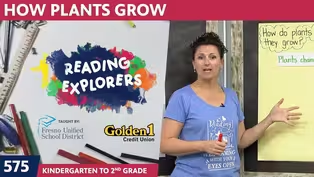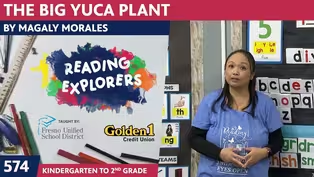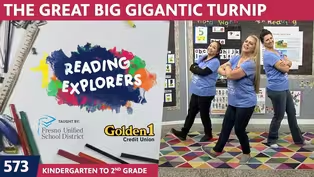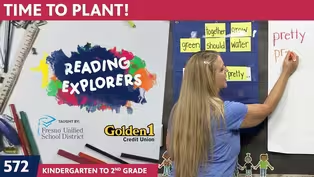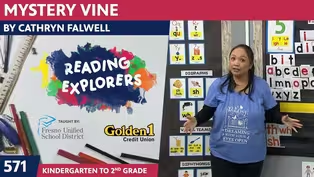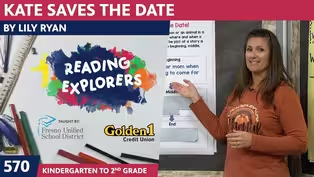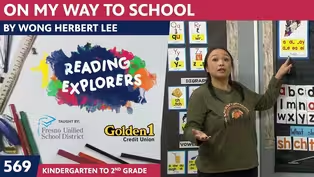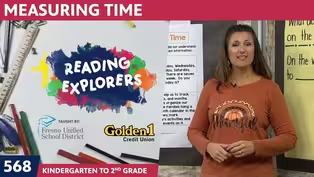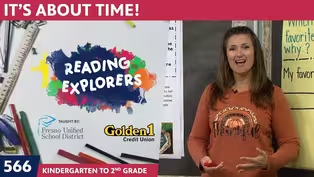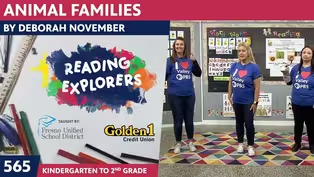
3-336: Syllables & Comprehension of Root Words
Season 3 Episode 196 | 14m 7sVideo has Closed Captions
Join Mrs. Nix at Camp Discovery!
Third Grade teacher, Mrs. Nix, welcomes students back to Camp Discovery, a fun learning space packed with reading adventures & fun games!
Problems playing video? | Closed Captioning Feedback
Problems playing video? | Closed Captioning Feedback
Reading Explorers is a local public television program presented by Valley PBS

3-336: Syllables & Comprehension of Root Words
Season 3 Episode 196 | 14m 7sVideo has Closed Captions
Third Grade teacher, Mrs. Nix, welcomes students back to Camp Discovery, a fun learning space packed with reading adventures & fun games!
Problems playing video? | Closed Captioning Feedback
How to Watch Reading Explorers
Reading Explorers is available to stream on pbs.org and the free PBS App, available on iPhone, Apple TV, Android TV, Android smartphones, Amazon Fire TV, Amazon Fire Tablet, Roku, Samsung Smart TV, and Vizio.
Providing Support for PBS.org
Learn Moreabout PBS online sponsorshipMore from This Collection
Valley PBS and Fresno Unified School District have partnered with Golden 1 Credit Union to create Reading Explorers Lessons for grades Pre-Kindergarten through Third grade. The daily lessons will be taught by Fresno Unified School District teachers and are created to help students practice their reading skills and reinforce lessons during distance learning.
Video has Closed Captions
Learn about the life cycle of a plant on Reading Explorers. (26m 39s)
K-2-574: The Big Yuca Plant by Magaly Morales
Video has Closed Captions
Join the Reading Explorers as we adventure into a new book The Big Yuca Plant. (26m 30s)
K-2-573: The Great Big Gigantic Turnip
Video has Closed Captions
What will happen at The Great Big Gigantic Turnip? (26m 30s)
K-2-571: Mystery Vine by Cathryn Falwell
Video has Closed Captions
The Bell has rung and the Valley PBS Classroom is open once more. (26m 32s)
K-2-570: Kate Saves The Date by Lily Ryan
Video has Closed Captions
Mrs. Nix, Mrs. Hammack and Mrs. Vang are glad to have you join her for a new day. (26m 32s)
K-2-569: On My Way To School by Wong Herbert Lee
Video has Closed Captions
Mrs. Vang is ready for a new day of phonemic awareness and reading comprehension. (26m 40s)
Video has Closed Captions
We review phonics, frequency words and more on Reading Explorers. (26m 45s)
K-2-567: Nate The Snake Is Late
Video has Closed Captions
What happens when Nate the Snake is late to school? (26m 49s)
Video has Closed Captions
It's time for school! How do you know what time it is? (26m 31s)
K-2-565: Animal Families by Deborah November
Video has Closed Captions
Welcome to the Reading Explorers lessons in the Valley PBS Classroom. (26m 14s)
K-2-564: From Caterpillar To Butterfly
Video has Closed Captions
The transformation from Caterpillar to Butterfly is a special one. (26m 52s)
Providing Support for PBS.org
Learn Moreabout PBS online sponsorship♪ Good morning to a brand new day ♪ ♪ Time to learn and games you play ♪ ♪ Learning things is so much fun ♪ ♪ Learning is good for everyone.
♪ (upbeat music) - Good morning third graders.
My name is Mrs. Nickson, I am so excited to be here with you on Monday morning to support you as you become amazing thinkers, readers, and writers.
What fun thing did you read over the weekend?
I would love to hear about it.
And you know what, if you share with me something that you've been reading there's a really easy way to do it.
Do you see that address that's gonna pop up right here on the bottom of the screen?
There it is.
If you let me know, what are some of those fun things that you're enjoying to read, I'll make sure to send you for free in the mail, a really fun activity book.
It has word searches and word puzzles.
You can send it to me either via mail or you can send me an email but don't forget to include your return address so that I can put one of these in the mail for you for free.
Speaking of reading, where can you choose to get some really good books to read?
Well, you can always go and check out your local County library or visit the app Sora and check out a book for free on there.
In Fresno unified, we love to celebrate our top schools who are checking out books using the Sora app and we count down the top five every week.
So in fifth place this week, we have Turner elementary.
So great job Turner.
Again, super easy to get your school up here on our countdown top schools.
You simply just need to check out those books on Sora and maybe tell a friend or two to do the same that's in your class.
And we can do that.
Alright, let's get started this morning.
I have three things that we're gonna go through this week in practice all week long.
We're gonna look at and review compound words.
We're gonna practice some syllables and then finish up with a little bit of comprehension around root words, okay.
Let's warm up those super smart muscles that we have, those brains by looking at our high frequency words and using those in a sentence.
All right, you ready to start?
Okay, let's get going.
Let me grab myself a pointer and let's do it.
You read a big and loud at home and I'm gonna read it right here.
Here we go.
Was, warm, wash, walk, water, way, went, well, were, and where.
Excellent job.
So I have two words we gonna focus on today.
You know what?
These are high-frequency words and third graders it's really important that not only you're able to read them, but to write them.
And the reason I say that, I taught third grade for a really long time.
And I still had third graders who forgot how to spell the word was, was.
So it's w-a-s not w-u-z, which is what you hear.
So practice it if you need to.
You're responsible for your learning success.
I know you can do it.
The second word is warm, w-a-r-m.
Okay, let's use them in a couple of sentences here.
Read with me, my dog lays in the sunlight to get mhh, alright, let's try the second one.
He mhh a very kind man, okay.
So let's look at the first one.
My dog lays in this sunlight to get was, no that doesn't make any sense.
My dog lays in the sunlight to get warm.
She was laying in the sunlight this morning, alright.
And how about this one?
He was a very kind man, alright.
How about that?
Nicely done third grade, okay.
We're gonna move down here and we're gonna look at some compound words.
Now, I don't necessarily have all of my words put together so that they'll make compound words.
We're gonna help kinda sort them out.
But the reason I wanna talk about it a little bit is looking right here, when we think about compound words, we know that it's two words that are put together that make a new word.
But it's really important for us to remember that those two words that make up that compound word help us understand what that word means.
Let's look at an example.
So if I have the word bed and I have the word room will each of these words have their own meaning.
And if I think about bed, that's something I sleep in, and if I think about the word room, okay that's just four walls and something on the ground and maybe a roof over the top, okay so that's a room.
But if I put them together and I say bedroom, well now I'm talking about a specific room where a bed is kept and where I would sleep at night, right?
So bedroom is the word, okay.
I have some other words over here that we gonna put together.
I have the word stop which means we're not gonna continue anymore, right?
And the word case, now think about if you're putting something inside of a case to carry it around like a bag or like a box or something like that, but you're gonna gather things together.
A light, so think about like sunlight or a light from a light bulb and book, okay.
So picture a book that something that you read, right?
So all of these words have their own meaning.
What if I put stop, which means we're not gonna go anymore, and I put it with light.
If I know what stop means that means I'm not gonna go anymore and light and I can picture what a stoplight is.
Do you see how we did that?
Okay, now case book doesn't make any sense.
So what if I switch these around and I think about a book and something that I carry things, something around in, or put together a book case.
That's where I store my books.
So a book case is with all the shelves and things for us.
So those are examples of compound words.
Alright, our next thing that we gonna practice are syllables.
And I wanna talk about this.
So when a word ends with a consonant followed by le, the consonant plus the le usually form the last syllable of the word, okay.
So here are some examples.
So here is the word drizzle.
So you can see right here that we have a consonant and an le so this is actually our final syllable, driz zle.
Now, if we look down here I kinda put a little cheater note for us because all can be spelled le, el, al and il .
So I have some examples here.
So channel, you can see ends with el and I can take that final consonant and put it with the el and now we have chan nel, so two syllables.
Look at this word here, total has that final consonant I'm gonna move the beginning over to tal, two syllables.
And our last one ends with an il and so we have the word pu pil, pupil.
A pupil is just the center part of your eye, okay.
Let's go through and practice some of this.
Oops, did I get that over far enough?
Perfect, okay.
So looking at some of this, we gonna go through and we're gonna practice some compound words and it says read each sentence and circle the compound word and write the two words that make that compound word up.
So help me out.
Let's read it together.
My sister's birthday is next Friday.
Do you see the word that's the compound word?
Yes, birthday is the compound word.
What two words are in birthday?
You got it birth, that's the day that you're born and day.
Oh, look at that, birthday.
It's the day you're born.
Okay, how about this one?
I helped my father build a birdhouse.
Okay, you see it too, good job right there, birdhouse.
What are our two words?
You've got bird, which is those little creatures that fly in the sky and house, which is something someone lives in.
But when we put those together now we're talking specifically about a house that is for birds, perfect.
And the newspaper is on the front porch.
What word do you see has two smaller words.
Yes, newspaper.
What are the two smaller words?
You've got it.
News, which is information about what's going on in the world, and paper is something that well, even I'm Mrs. Nickson is writing on paper right now.
So if I'm looking at a newspaper, I'm looking at a paper that has information about what's happening in our community or within our world.
All right, excellent.
Let's look down here and practice a little bit with those final syllables.
Remembering those words that end with le, el, al or il.
And it says, underline the word that has that consonant plus those final syllables, le, el, al or il, and then circle that final syllable.
So looking here we have local and lock.
Okay, local has it so what would be the final syllable?
You got it, cal, don't forget you want to include that final consonant.
Then we've got tool and total.
Yes, total has that al don't forget the consonant, there's your final syllable, to tal, good.
And then we've got able and also, yes able has that le don't forget the consonant which is the b, and then you've got able, two syllables.
Great, nicely done, all right.
Last little bit for today.
We're gonna look at and practice some root words.
Now what's a root word?
A root word is the simplest form of a word, a root word is a word to which no prefixes, suffixes or inflectional endings have been added.
So what are we gonna be looking for?
We gonna look for those prefixes and I've kinda put some cheater notes up here so we can remember together that prefixes come at the beginning, like on, re, dis suffixes, they're found at the end of a word, like full, ness, able and inflectional endings would be like ing or ed, okay.
So now let's look, we have a little information.
Let's look at our sentence here.
The math teachers specialty is fractions, okay.
If I don't know the word specialty I can find my root word, and if I know what my root is, it can help me understand what this longer word is.
So specialty, I'm gonna look, do I see any prefixes?
Nope, I don't see any prefixes.
Do I see any suffixes?
No, but I do see some inflectional ending.
I'm gonna take the ty off and now I have what's called a root word and the word is special.
And I'm gonna think to myself, do I know what special means?
Yes, special just means it's one of a kind, right?
So, if I think about one of a kind, something that's very unique when I go back and I apply it to my sentence, the math teachers specialty is fractions.
That simply means, the teacher knows that one the most, all right.
Boys and girls, thank you so much for hanging out with me today as you're getting ready for school, remember you are responsible for your learning success.
So listen, ask questions and share your ideas because together we can do so much more.
Have a wonderful afternoon, I can't wait to see you back here tomorrow, bye-bye.
(upbeat music) ♪ Good morning to a brand new day ♪ ♪ Time to learn and games to play ♪ ♪ Learning things is so much fun ♪ ♪ Learning is good for everyone.
♪ (upbeat music)
Support for PBS provided by:
Reading Explorers is a local public television program presented by Valley PBS
